Storage - Availability Settings
Each store is associated with its own settings which control whether or not the store is available for updates and searches, together with retention period and legal hold settings. These options are included on the availability tab:

Options on this tab are summarized below:
|
Option |
Summary |
|
Available to search |
This check box determines whether or not the contents of this store can be searched. Although security permissions can be set to specify which users can search the store, there may be times where you need to use this option to quickly disable searching, irrespective of security permissions (for example, if there is a network/hardware problem or a corruption). |
|
Can add new messages |
If required, use this option to prevent further messages being added to the store (for example, if there is a network/hardware problem or corruption). |
|
Legal hold |
This option can be used to prevent any 'tampering' with the content of the store - for example, if there is an ongoing internal or legal investigation. When this check box is selected, it is not possible to remove email messages from the store, even if messages reach the specified retention period (see below), or have been selected for deletion. |
|
Retention period |
Currently, this is the only means by which messages are deleted from an archive store. When a message becomes one day older than the specified retention period, it is deleted from the store. The only exception to this is if the legal hold setting is selected for the store; in this case, the retention period is ignored (and is greyed out) so messages are not removed. By default, the retention period is set to twenty five years but a common setting is seven years. When a message meets the retention period and is deleted, this logs an event in the Exclaimer event log. |
|
Any changes made to store settings will be shown in the auditing log (if enabled). This is particularly important for legal hold and retention period settings, so - for example - a user cannot change settings surreptitiously in order to remove incriminating messages. |









